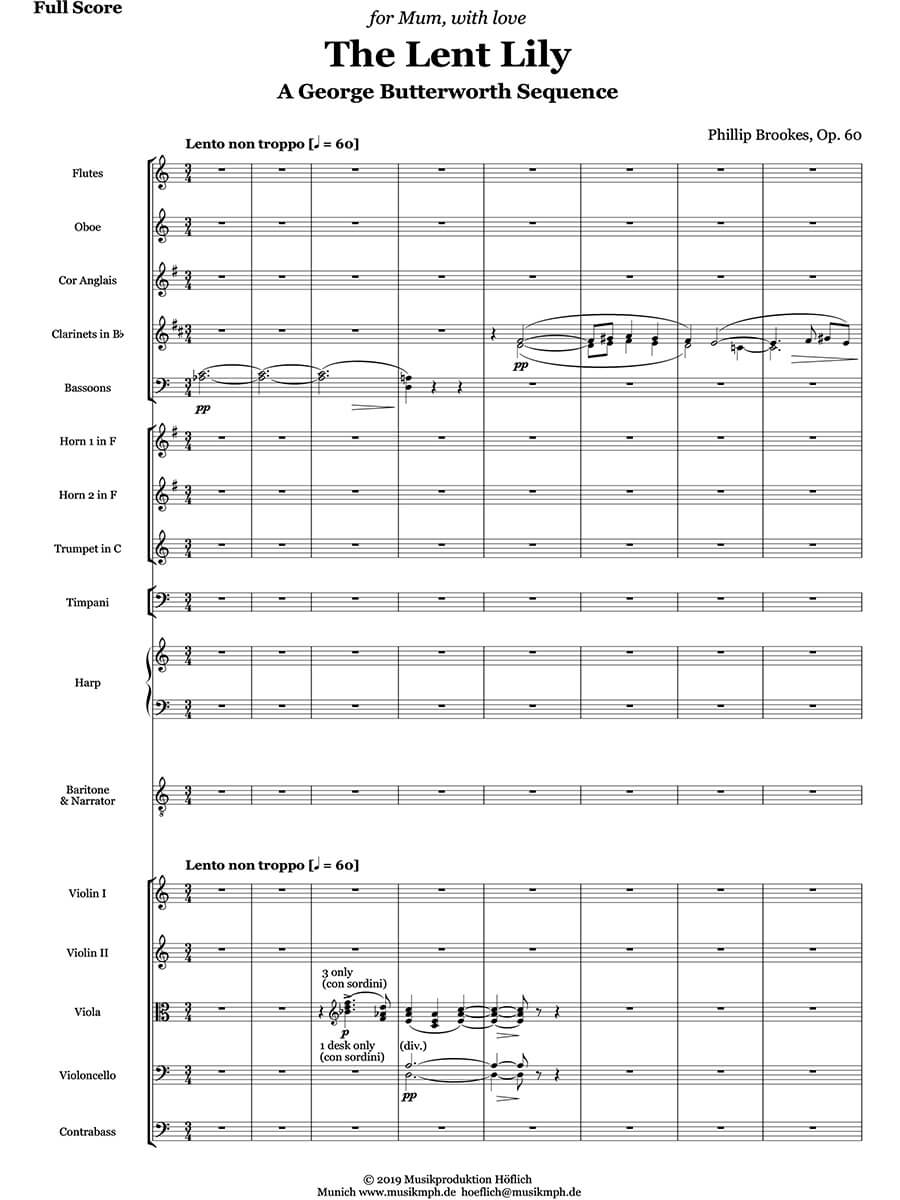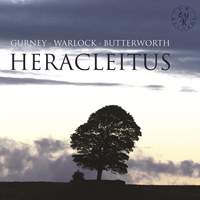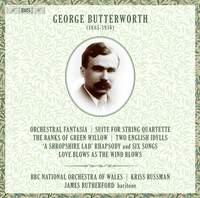That event looks most interesting Pabs - thanks for the info: I shall have to see what I'm doing on Jan 26th!
Butterworth, George (1885-1916)
Collapse
X
-
Thanks for all the above, Pabs. Just because:doesn't mean we're not interested in biograpphy! It's just because your contributions are so complete in themselves there seems no need to reply.there were no comments after my last two posts
[Off topic, but the same can often be said of the Early Music sub-forum, where very often Doversoul's unfailing heads-ups go un-answered. It's because we like what we hear and have nothing to add.]
Comment
-
-
I'd very much like to be there but will be out of the country. Modest contribution made to the post-production costs. And request put in to Santa for the book.Originally posted by Pabmusic View PostThis is almost out. I had no direct connexion with it, except that Hugh Butterworth (remarkably, a 1st cousin!) sent me raw footage of interviews he did for the film, and sent a draft of my book to the film-maker.
 Find out about all events organised by the British Library; the latest exhibitions, special events and lectures. Book your ticket now!
Find out about all events organised by the British Library; the latest exhibitions, special events and lectures. Book your ticket now!
And here's a trailer:
https://www.georgebutterworth.co.uk
Comment
-
-
That's very reassuring, when it comes to coping with the paucity of responses to my own weekly alerts to jazz programmes!Originally posted by ardcarp View PostThanks for all the above, Pabs. Just because: doesn't mean we're not interested in biograpphy! It's just because your contributions are so complete in themselves there seems no need to reply.
[Off topic, but the same can often be said of the Early Music sub-forum, where very often Doversoul's unfailing heads-ups go un-answered. It's because we like what we hear and have nothing to add.]
Comment
-
-
Out today.
This was intended to be published with The Book (which came out last December) but it didn't happen. The full description is on the publisher's site:
 Brookes, Phillip: The Lent Lily, Op. 60, a George Butterworth sequence for Baritone, narrator & small orchestra (first print). Published in April 25, 2019. Available at mph Muenchen.
Brookes, Phillip: The Lent Lily, Op. 60, a George Butterworth sequence for Baritone, narrator & small orchestra (first print). Published in April 25, 2019. Available at mph Muenchen.
It lasts more than 50 minutes! Now to find a performance...


Comment
-
-
Of course. It's untitled, except that the binding (leather, gold blocked) calls it Suite for Sting Quartette (sic). It perhaps dates from 1910 - Hugh Allen thought it was no later - but why it was written, we don't know. There are possibilities. Perhaps it's something to do with his enrolling at the RCM in September, to study organ with Walter Parratt and composition with Charles Wood. He also paid for a few private lessons with Wood about this time. Or perhaps it's connected with his enrolment the same year for a B. Mus. at Oxford. (He never completed either because his mother died in January 1911 and he was occupied with administrative stuff and composing throughout 1911.) My own feeling is that it had something to do with Frank Bridge, whom he knew reasonably well because Bridge and the English String quartet helped out in concerts at Eton (Bridge was close to Thomas Dunhill, the Assistant Music Master).Originally posted by Stanfordian View PostHello Pabs,
I was wondering what you can please tell me about Butterworth's work for string quartet. Is it a completion? Is it worth hearing? etc.
I don't think the Suite is quite complete (though that view is not universally shared). At least the third movement da capo is not written out completely - there are empty pages for that to be done. There's five movements, and the second seems very short. Also the last ends a little abruptly. whether it's finished or not, Butterworth would surely have revised it (he was a brilliant reviser).
Having said all that, it's certainly worth hearing - GSKB clearly is finding his 'folk' voice, though there are no folk tunes in it. I think the first three movements are very fine, the fourth very good, and the last meanders a bit. It's worth hearing for the third movement - a scherzo (how often do you associate that with Butterworth?).
There are two recordings. The Quartette itself is here, though I think it's a little bit 'careful':
Heracleitus. EM Records: EMRCD036. Buy CD or download online. Charles Daniels (tenor), Michael Dussek (piano) The Bridge Quartet
And it's here, arranged for string orchestra:
George Butterworth: Orchestral Works. BIS: BIS2195. Buy SACD or download online. James Rutherford (baritone) BBC National Orchestra of Wales, Kriss Russman
Hope that helps.Last edited by Pabmusic; 27-04-19, 12:44.
Comment
-
-
Hello Pabs,Originally posted by Pabmusic View PostOf course. It's untitled, except that the binding (leather, gold blocked) calls it Suite for Sting Quartette (sic). It perhaps dates from 1910 - Hugh Allen thought it was no later - but why it was written, we don't know. There are possibilities. Perhaps it's something to do with his enrolling at the RCM in September, to study organ with Walter Parratt and composition with Charles Wood. He also paid for a few private lessons with Wood about this time. Or perhaps it's connected with his enrolment the same year for a B. Mus. at Oxford. (He never completed either because his mother died in January 1911 and he was occupied with administrative stuff and composing throughout 1911.) My own feeling is that it had something to do with Frank Bridge, whom he knew reasonably well because Bridge and the English String quartet helped out in concerts at Eton (Bridge was close to Thomas Dunhill, the Assistant Music Master).
I don't think the Suite is quite complete (though that view is not universally shared). At least the third movement da capo is not written out completely - there are empty pages for that to be done. There's five movements, and the second seems very short. Also the last ends a little abruptly. whether it's finished or not, Butterworth would surely have revised it (he was a brilliant reviser).
Having said all that, it's certainly worth hearing - GSKB clearly is finding his 'folk' voice, though there are no folk tunes in it. I think the first three movements are very fine, the fourth very good, and the last meanders a bit. It's worth hearing for the third movement - a scherzo (how often do you associate that with Butterworth?).
There are two recordings. The Quartette itself is here, though I think it's a little bit 'careful':
Heracleitus. EM Records: EMRCD036. Buy CD or download online. Charles Daniels (tenor), Michael Dussek (piano) The Bridge Quartet
And it's here, arranged for string orchestra:
George Butterworth: Orchestral Works. BIS: BIS2195. Buy SACD or download online. James Rutherford (baritone) BBC National Orchestra of Wales, Kriss Russman
Hope that helps.
Thank you very much indeed for that interesting info. I'll certainly be listening to it later this week. This time period is of great interest to me and of course in particular anything concerned with the RCM and Sir C.V. Stanford.
Comment
-
-
Remember that GSKB never wrote anything to commission. Anything he did write was entirely his own wish. He did write for string quartet again in 1911-1912, when he composed Love Blows As The Wind Blows (for voice & quartet). Again we have no idea why. It wasn't performed until 1918, sung by Frederick Grisewood (yes!) and the English String Quartet. including Frank Bridge. Butterworth revised it in 1914, scoring it for voice & orchestra.Originally posted by Stanfordian View PostHello Pabs,
Thank you very much indeed for that interesting info. I'll certainly be listening to it later this week. This time period is of great interest to me and of course in particular anything concerned with the RCM and Sir C.V. Stanford.
Comment
-
-
This piece of mine was a victim of the coronavirus. A London ensemble (amateur) was seriously interested in it - I'd sent off scores and vocal scores. But of course that's at least "on hold" if not abandoned.
So I've produced a video using computerised sound (quite good sound, though). Obviously there's no singer, though the tunes are emphasised. Likewise there's no narrator so everything id sone as rolling script. But if you persevere there's quite a lot of unknown Butterworth (and unknown me) in this.
Comment
-
-
Good to see you here again! I'm listening now - (on good speakers!). The orchestral sound is quite decent - unnerving, really ("keep music live" - when we can - but of course here this is the chance for your work to be heard). And I can imagine a baritone substituted for the line played by a horn sound.
I hope the piece gets its performance and that I can get to go. (BTW, I still play "Mr Bunting goes to Town" from time to time. Cheers me up.)
Comment
-
-
You are kind. I really thought this had a chance, but then the virus came.Originally posted by Cockney Sparrow View PostGood to see you here again! I'm listening now - (on good speakers!). The orchestral sound is quite decent - unnerving, really ("keep music live" - when we can - but of course here this is the chance for your work to be heard). And I can imagine a baritone substituted for the line played by a horn sound.
I hope the piece gets its performance and that I can get to go. (BTW, I still play "Mr Bunting goes to Town" from time to time. Cheers me up.)
Comment
-



Comment